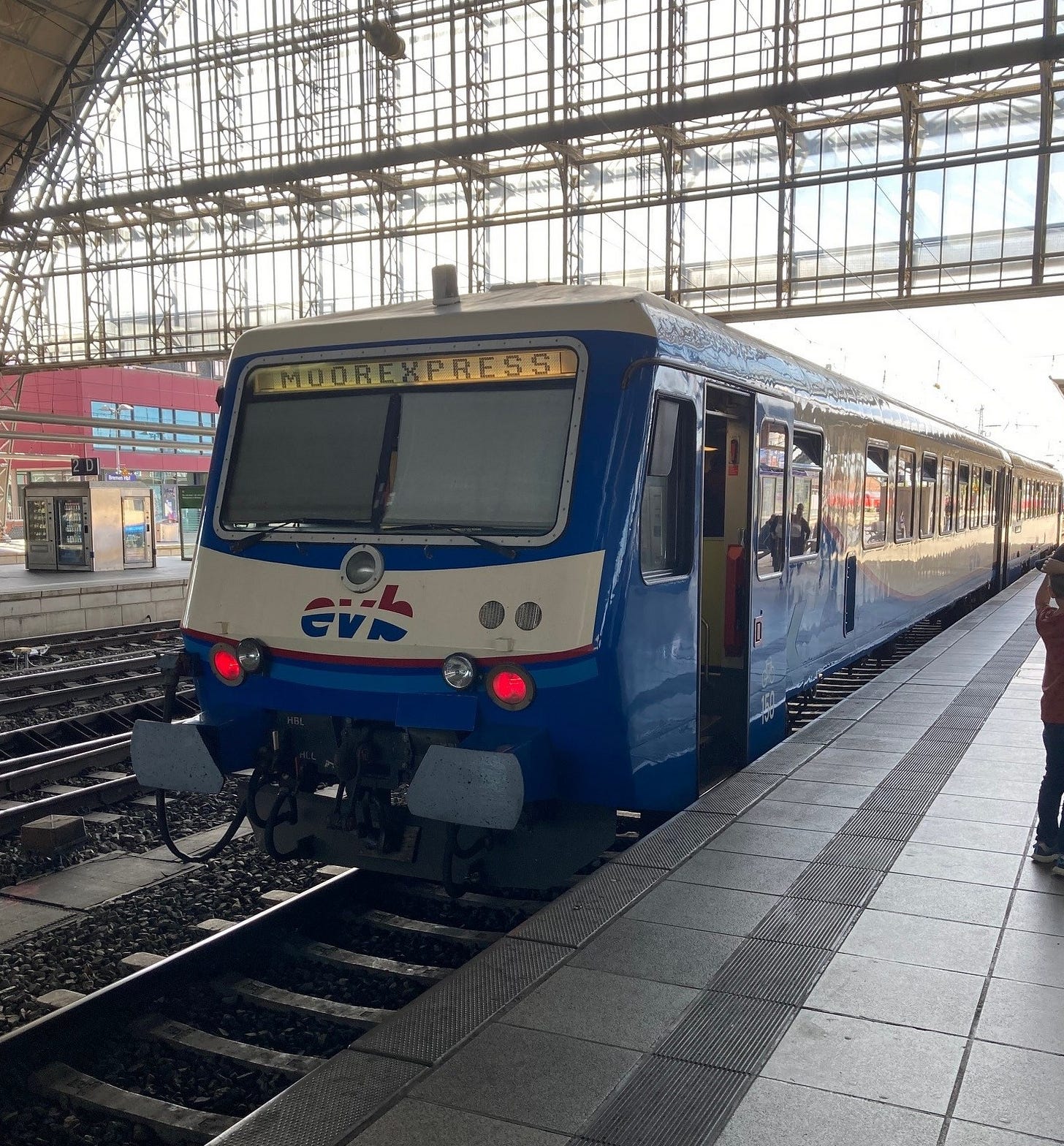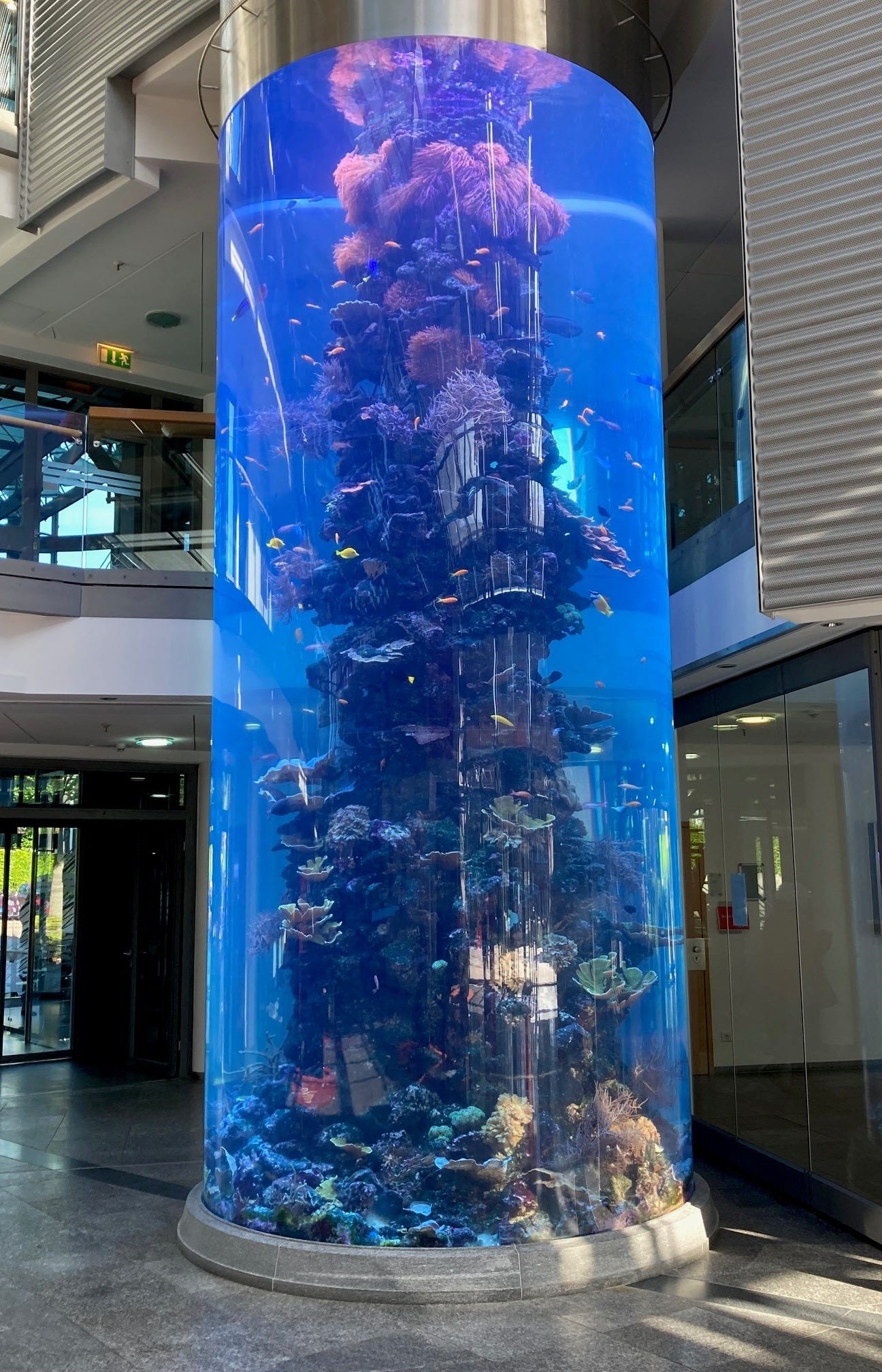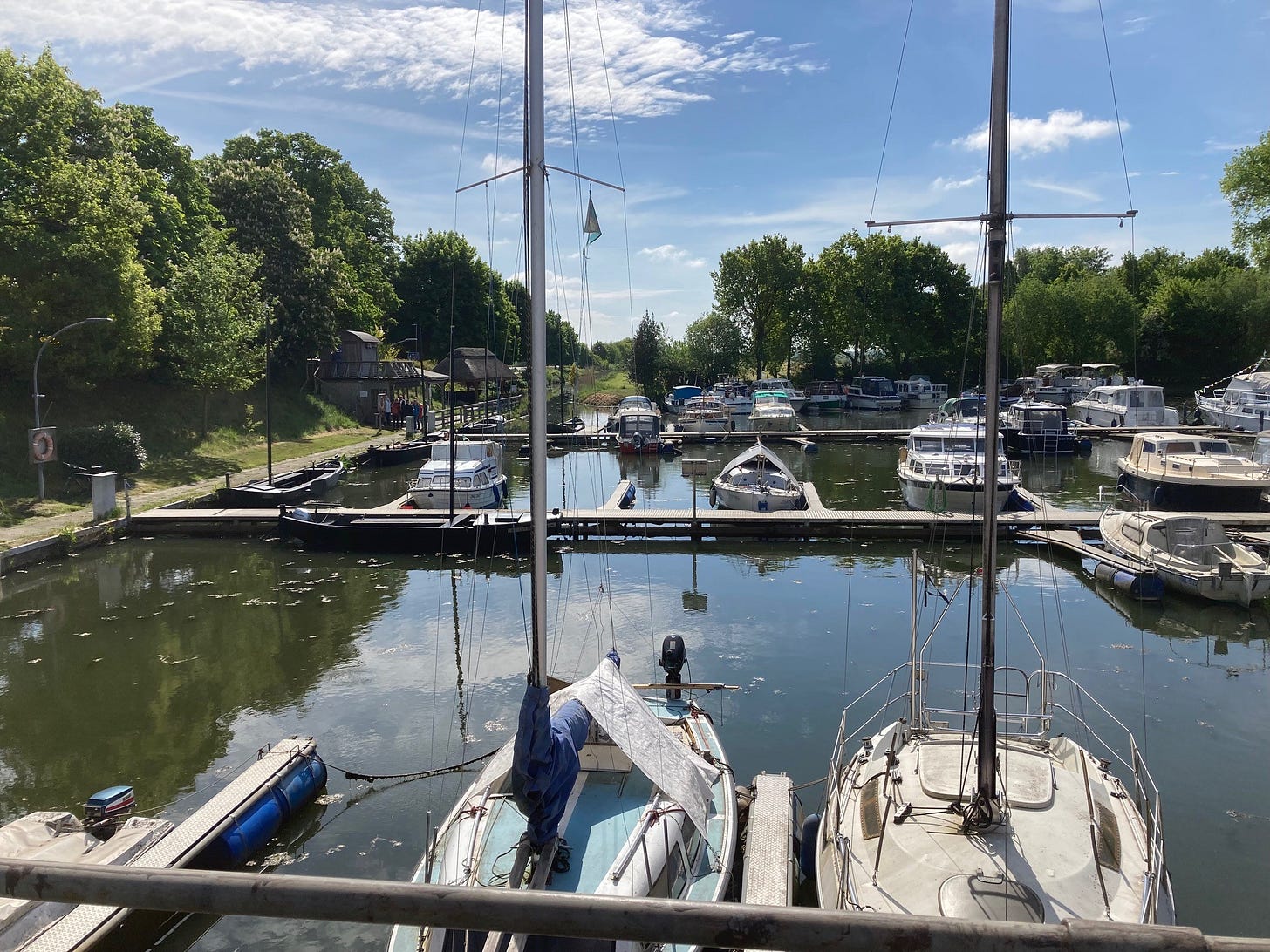Before we get started: a very happy Mother’s Day to all you mothers out there!

I sent my last “Letter From London” just over a week ago, as we were departing the UK by train for Germany, where my parents-in-law live. So now I thought I should send a missive from my new location. Their town is called Osterholz-Scharmbeck, which doesn’t exactly lend itself to a nice, catchy English title. But OHZ (as they call it for short) is in the province of Lower Saxony, or Niedersachen in German. Hence “Notes from Niedersachsen.”
Osterholz-Scharmbeck is located just north of Bremen, and a bit south of that city’s port, Bremerhaven, on the North Sea. The surrounding area is extremely flat and consists mainly of a moor landscape, the “Teufelsmoor,” that is characteristic of the region. Over many, many years, the inhabitants drained the moors by digging a network of canals; every now and then you still spot an old-fashioned “Torfkahn” sailing along one of them. This process eventually opened up fields for agriculture, but for a long time the chief resource of the drained moors was peat. Used for fuel, it was dug up and shipped out over the canals. The peat farmers typically eked out a difficult existence. An old saying captures their struggles: “Dem ersten sein Tod, dem zweiten seine Not, dem dritten sein Brod”—or in the low German Plattdeutsch dialect that is still fairly common in the region, “Den Eersten sien Dod, den Tweeten sien Not, den Drütten sien Brod.” It took three generations of hard work for a farm to become viable: “death for the first; poverty for the second; bread for the third.”
Fortunately, my in-laws were not peat farmers, so theirs has not been quite such a hardscrabble existence. These days, despite some remaining rural poverty, there is a whiff of romantic nostalgia about the moors, which lure cyclists and hikers, or where on weekends the “Moor Express”—which we caught this afternoon for a short outing to Bremen—carries passengers through the countryside.
I first came here about 30 years ago, when my wife and I were engaged, but my memories of the town from that first visit—when my German was not as good as it is now and I was struggling to keep up with my future parents-in-law and my wife’s five siblings—are a bit foggy. I do remember that just down the street from their house, the Sparkasse, a bank, was engaged in a large building and renovation project. The fences surrounding the constuction site proudly proclaimed, “Raum für die Zukunft!,” room for the future! When we returned later the enlarged bank housed an unusual attraction: a large, two-story saltwater aquarium, with brightly colored tropical fish swimming around coral and plants waving in the currents. If you happened to show up at the right time, you could see a diver descend into the tank from above in order to clean it, something that was pretty exciting for our children on later visits. (I remember one other motto from that initial trip, a slogan from the DM-Drogerie Markt chain of drug stores: “Hier bin ich Mensch, hier kauf’ ich ein!” In English, it sounds a bit odd—here I’m a real human being, here I go shopping!—but it’s a pun on a life from Goethe’s Faust, “Hier bin ich Mensch, hier darf ich sein,” here I’m a real human being, here I can make myself at home. Funny what sticks in one’s head!)
It isn’t easy to top a two-story saltwater aquarium, but OHZ does have some other attractions besides the surrounding moor. Tucked away at the end of a residential street, for instance, so unostentatious that you could easily walk past without noticing it, is the “Hünengrab,” an arrangement of large boulders marking a 4000-year-old, prehistoric gravesite. Or there is an impressive old windmill, the Windmühle von Rönn (named after a family that owned it), built in 1882. Today it houses a café. At present the windmill’s sails are being replaced. I also learned this weekend, for the first time, that Osterholz-Scharmbeck has its very own port, as well as a small airport for gliders. The former opens onto one of the moor canals, which leads—if I correctly remember my wife’s description—into the Hamme, which leads into the Wümme, which leads into the Lesum, which leads into the Weser, which leads into the North Sea. The airport had an open house yesterday, so we stopped by and saw a few of the gliders take off and land.
We’re also quite close to the town of Worpswede, home to a famous artists’ colony in the late 19th and early 20th centuries. The most highly regarded artist from the group was probably Paula Modersohn-Becker; the poet Rainer Maria Rilke also spent time here, marrying the sculptor Clara Westhoff and writing a book about the town and its artists. There’s a nice museum showcasing the Worpswede artists and the town still contains a number of galleries, but our visits there are familial rather than cultural: we go to visit my mother-in-law, who has been in a home there for the last several years. We’ll see her today, of course, for Mother’s Day.

I ought to be spending my time here reading lots of German literature, and normally I would have already picked up a few titles from the local bookshop, the Schatulle, but I’m still finishing off Barnaby Rudge from London—only 50 more pages to go!—and at this point, bruised by the experience of lugging our suitcases from London to OHZ and leery of airline weight limits, I am exercising more self-control than I usually muster. I did give in to temptation last weekend at a flea market, however, when I found, for a couple of Euros each, a thin volume of Luther’s letters and a copy of his small catechism in German.
Many years ago I had to memorize chunks of the latter for confirmation class. My father was serving as vacancy pastor for a Lutheran congregation and took advantage of the opportunity to make sure his son received decent instruction; I don’t suppose any of his other pupils appreciated that they were being taught by a highly regarded Lutheran theologian. I flipped open my new German catechism to the first article of the Apostle’s Creed (“I believe in God, the Father Almighty, Maker of heaven and earth”) and began reading Luther’s explanation of it: “Ich glaube, daß mich Gott geschaffen hat samt allen Kreaturen, mit Leib und Seele, Augen, Ohren und alle Glieder, Vernunft und alle Sinnen gegeben hat und noch erhält….” And there I was, back in confirmation class some 40 years ago: “I believe that God has made me and all creatures; that He has given me body and soul, eyes, ears, and all my members, reason and all my senses, and still cares for them….”
My wife also found, at the same book stall, a “Catechetical Handbook” on the Catholic Catechism—also for only a few Euros, but much fatter and heavier than my little one by Luther! So both the Lutheran and the Catholics in the family came away from the flea market equipped with spiritual nourishment, and perhaps another pound and a half in our suitcase.
Although I haven’t been buying many books, I do peruse the newspaper each morning, and there has been quite a bit to read about over the past week. First Germany elected a new chancellor, Friedrich Merz of the center-right Christian Democratic Union (CDU). It wasn’t easy. For the first time in the country’s postwar history, the chancellor was not elected on the first vote, and Merz needed a second ballot to secure the requisite majority in parliament. Either some of his own party members or those of his coalition partner, the center-left Social Democrats (SPD), must have withheld their support—not an encouraging sign for the new government, and an embarrassment for Merz, who has his work cut out for him.
The far-right, national populist Alternative for Germany (AfD)—American readers can think of it as the German MAGA, UK readers as a more extreme version of Reform—has been surging and is now the country’s second-largest party (the largest in many parts of former East Germany). Within the past week, Germany’s intelligence service officially labeled it an “extremist” party that threatens the democratic order, and there is a lively debate going on about how to respond to that designation. (
’s “Zeitgeist” has a pretty sensible discussion of this today.) The CDU has refused to enter a coalition with the AfD at the national level—which I think is wise—but Merz would also face intense scrutiny even for passing legislation that was dependent upon AfD votes, which I think is more questionable. This leaves the CDU in particular little room to maneuver and, I fear, dooms Germany to coalition governments that lack the coherence to enact an effective program. Merz will require considerable political skill to navigate this situation, but Germany needs him to succeed.Nor was that the only noteworthy election to occur this week, of course. “Habemus,” as they say, “Papam.” It was interesting to see the announcement of a new pope while here in Germany. I did not expect to see an American chosen, but it was hard not to feel a little proud of my fellow countryman, especially when he immediately addressed the crowd gathered in St. Peter’s Square first in fluent Italian, then in Spanish. I’m afraid that I find all the accompanying commentary a bit wearisome, as within seconds of his first short speech, people immediately began trying to spin it in ways favorable to their brand of Catholicism. On German television, almost the first question raised was whether Leo XIV might be favorable to the ordination of women—as if that were the most important issue facing the church. The commentators were eager to emphasize that the new pope had indicated a desire to carry forward the legacy of his predecessor, Francis—finding much more between the lines of his brief address than I was able to discover there, I have to confess. Meanwhile, some of the more conservative commentary I have read from back in the States expresses cautious optimism that Leo will prove more independent-minded and will reaffirm church teachings that Francis had called into question.
For my part, if a non-Catholic can express an opinion, I think it would be a good thing if the new pope proved less ready than the old one to sow uncertainty about what the church actually believes. But most of all, we can simply hope that Leo will prove to be a good pope. If Friedrich Merz has his work cut out for him holding together a divided Germany, that pales before the task of the bishop of Rome. Several times during his speech, I thought Leo appeared to be suppressing powerful emotions and even forcing back tears. And I found myself thinking—hardly an original observation on my part—how utterly overwhelming it must be to step out on the balcony, to see the huge crowd below cheering and welcoming you, and to realize, “I’m responsible for all of them, and for millions more like them all over the world—and God will hold me accountable for it.” Not a task for the faint of heart.
With that, I should bring these “Notes from Niedersachsen” to an end. I’m not sure if I’ll write again from this location. But whenever I next write, and wherever it’s from, thanks for reading, and I’ll see you next time for another installment From My Bookshelf.










Caspar David Friedrich painted a number of these Hünengräber, whose etymology suggests erroneously that giants are buried there! They are all over North Germany, dating from the late Neolithic period.